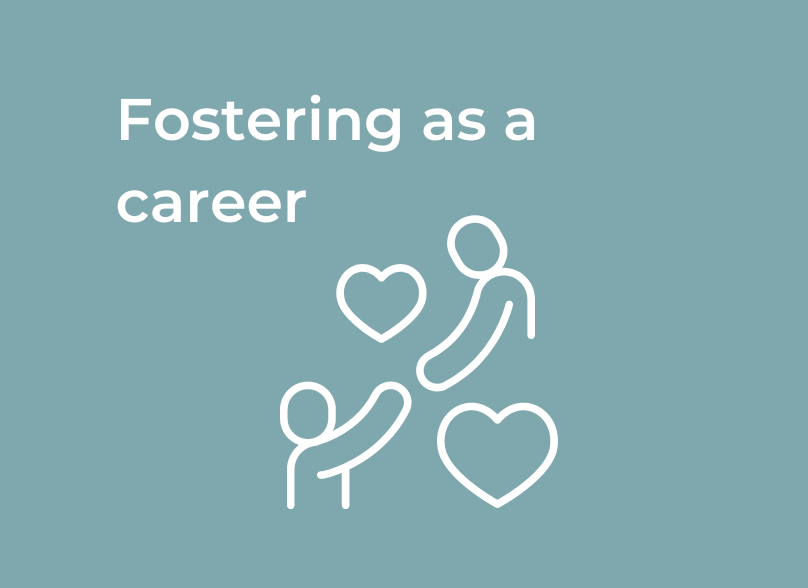Fostering as a career
By choosing a fostering career, you’ll offer life-changing support to vulnerable children.

Is fostering a job?
Fostering is a career. If you want it to be. Between the time, dedication, and training involved, plenty of foster carers focus solely on creating a safe and loving home for the children in their care.
That said, fostering isn’t the same for everyone. Some people dive in full-time, while others juggle fostering with part-time or flexible work. It all depends on your situation, the type of fostering you do, and what the children need.
But fostering isn’t just a job. It’s a vocation. It’s a chance to make a real difference, as well as gaining a deep sense of fulfilment. The joy of seeing a child grow, knowing you’re giving them stability and care, is something no paycheck can match. It’s a career that is not without challenges, but it also comes with huge rewards that stay with you forever.
Can you work and foster?
Yes, you can work and foster! As long as it’s the right balance for your family and the children in your care. Many foster carers successfully juggle their careers and fostering, but there are a few key factors to consider before taking the plunge.

What to consider when balancing a career and fostering:
-
Your employer: Are they supportive and will they allow you to be more flexible with your working hours.
-
Support network: You will need some help. Having a reliable support network of friends and family will make a massive difference.
-
Your current work-life balance: If your work is already incredibly demanding, then you may not have the space in your life to give a child the support that it needs.
-
The agency you choose: The support from your agency is critical. Picking an agency that has with experience supporting working foster families, is social worker-led, and with a small, friendly, approachable team is more important than the financial support you’ll get.
With a little planning and a lot of support, it’s entirely possible to balance work and fostering - and make a real difference to a child in the process.

How much do foster carers get paid?
When you choose to foster, you’ll receive a generous package that is designed to cover the costs of care and recognise the incredible work you do. We’re proud to offer a competitive rate that ensures you’re fully supported in providing the best possible care.
Your allowance covers essentials like food, clothing, and household bills, as well as additional expenses for any special requirements your foster child might have. The exact amount depends on the child’s needs, the type of fostering you’re doing, and where you’re based, but we make sure it’s fair compensation so you feel supported every step of the way.
Alongside your financial allowance, you’ll have access to regular training and round-the-clock support from our team to help you feel confident and prepared. You’ll also get 14 days of respite care, so you and your family have a chance to rest and recharge.
If you’d like to learn more about how your allowances and benefits are calculated, we’re always here to talk it through!
How to become a foster parent
Speak with Us
The first step is to get in touch! We’ll have a chat to learn more about you, answer your questions, and explain what fostering involves. This is your chance to find out if fostering is the right fit for you.
Home Visit
Next, we’ll arrange a visit to your home. Don’t worry - it’s not about perfection! We’ll check that your home is safe and has enough space for a child, and we’ll talk more about what fostering looks like day-to-day.
Application Form
If you’re ready to move forward, you’ll fill out an application form. This gives us all the important details about you, your family, and your background so we can get the ball rolling.
Checks and References
As fostering is such an important role, we’ll carry out thorough checks, including a DBS (Disclosure and Barring Service) check, and speak with your references. This is to make sure everything is in place to support you and the child you’ll care for.
Fostering Training
Before you welcome a child into your home, you’ll attend our fostering training sessions. These are designed to give you the tools, knowledge, and confidence to provide the best care possible.
Panel Interview
The final step is meeting our fostering panel. This is a chance for us to discuss your application and for you to share why you want to foster. If approved, you’ll officially be ready to start your journey as a foster carer!

Frequently Asked Questions
There are many different types of fostering. Each one is unique as the child needing care, and each comes with its own set of challenges and rewards. We’ll help you to decide what is the best fit for you.
-
Short-Term Fostering: Temporary placements, ranging from a few days to a couple of years, until a child can return to their family or move to a permanent home.
-
Long-Term Fostering: Provides a stable home for children who can’t return to their birth family, often lasting until they reach adulthood.
-
Emergency Fostering: Immediate care for children in urgent situations, sometimes overnight or just a few days.
-
Respite Fostering: Short breaks for foster families, ranging from a few hours to a weekend.
-
Parent and Child Fostering: A young parent and their baby live with a foster family.
-
Therapeutic Fostering: Specialised care for children with complex emotional or behavioural needs, often requiring additional training.
-
Teenager Fostering: Supporting young people and helping them transition into adulthood.
-
Sibling Fostering: Keep siblings together in one home to maintain their family bond.
-
Unaccompanied Asylum-Seeking Children (UASC): Providing care and stability for children arriving in the UK without a parent or guardian.
When they turn 18, they will officially leave foster care. The local council remains responsible for providing support, such as a personal adviser and a pathway plan.
Foster care includes collaborating with teachers, social workers and counsellors to provide comprehensive support for children.
Want to know more? Check out the resources below
Still have questions about fostering?
Choose a date and time on the calendar below, and one of our fostering advisors will give you a call to discuss any questions you might have.


